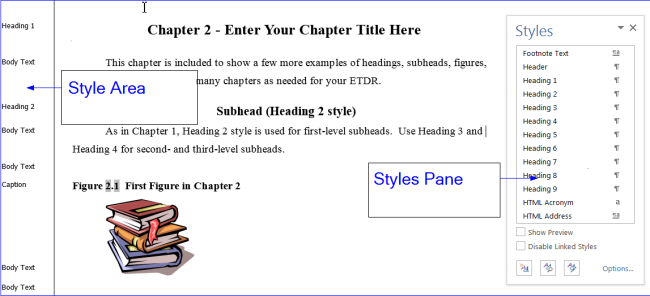
- #HOW TO APPLY HEADING STYLES IN WORD 2013 MANUAL#
- #HOW TO APPLY HEADING STYLES IN WORD 2013 FULL#
- #HOW TO APPLY HEADING STYLES IN WORD 2013 CODE#
If the corresponding levels are marked with a style, they can be quickly and conveniently moved to the desired position using the outline view tools.

This view is also suitable for making corrections to the structure of a text and moving text sections around within the document swiftly and with ease.

For a better overview, it’s possible to display only two levels, for example. The default outline view displays all levels of the document. In this view, the headings are arranged hierarchically – if there’s a plus sign on the left side of a heading, it means that it has another text level below it, while a minus sign is followed by continuous text only.
#HOW TO APPLY HEADING STYLES IN WORD 2013 FULL#
In the outline view it’s possible to move individual sections of a document clearly and with full control.
#HOW TO APPLY HEADING STYLES IN WORD 2013 MANUAL#
Initially, manual formatting may seem to be easier and quicker, but for longer texts it’s more efficient to use Word styles instead of repeatedly formatting sections of text separately. This is particularly noticeable when editing complex documents, such as final papers or manuscripts.
#HOW TO APPLY HEADING STYLES IN WORD 2013 CODE#
Note that the code doesn't insert empty paragraphs where there already is one and that I've made provision for you to apply your Style.Preset as well as custom styles make it easier to work on a text document. Therefore, if necessary to add more frames, you have to insert new paragraphs manually and apply the style. Watch this video to know about the steps to use headings and styles in Microsoft Word 2013 document.Content in this video is provided on an 'as is' basis wi. You cannot run the macro a second time, because the code will not check for existing frames. So, if there is a bookmark, the bookmark will be expanded to the new paragraph.ģ. "InsertBefore" in the code means, that a new paragraph will be created from theīeginning of an existing paragraph.

In documents with tables, I will get an error message, and the frames will be inserted not before the last table.Ģ. Your Code works like a charm, thank you so much :-).ġ. Thenĭoc.Bookmarks.Add Name:=BkMk.Name, Range:=Rngĭo note, though, that this could take considerably longer to complete processing in a document with many bookmarks. If you want to transfer the setting to your template, do the following: Before clicking OK, select New documents based on this template. Click the Modify button and select Add to Quick Style list. If (InStr(.Style, "Heading ") 1) And (.Style Stl) ThenĮlseIf Len(.) > 1 Then You can apply the styles to text from the Apply Styles pane (Ctrl+Shift+S). Range.Information(wdWithInTable) = False Then Dim Rng As Range, Doc As Document, BkMk As Bookmark, i As Long


 0 kommentar(er)
0 kommentar(er)
